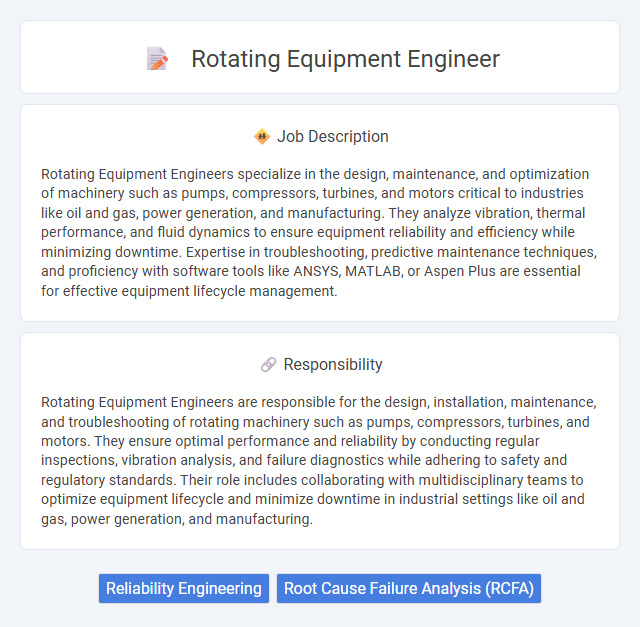
Rotating Equipment Engineers specialize in the design, maintenance, and optimization of machinery such as pumps, compressors, turbines, and motors critical to industries like oil and gas, power generation, and manufacturing. They analyze vibration, thermal performance, and fluid dynamics to ensure equipment reliability and efficiency while minimizing downtime. Expertise in troubleshooting, predictive maintenance techniques, and proficiency with software tools like ANSYS, MATLAB, or Aspen Plus are essential for effective equipment lifecycle management.
People who have strong problem-solving skills and enjoy working with mechanical systems may be well-suited for a Rotating Equipment Engineer role. Those who can handle high-pressure environments and possess attention to detail might have a higher probability of success in maintaining complex machinery. Individuals uncomfortable with hands-on technical challenges or irregular work hours may find this job less suitable.
Qualification
Rotating Equipment Engineers typically require a bachelor's degree in mechanical engineering or a related field, with specialized knowledge in the design, operation, and maintenance of turbines, pumps, compressors, and other rotary machines. Proficiency in industry standards such as API, ASME, and ISO, along with experience in vibration analysis, lubrication systems, and reliability engineering, is essential. Certification from recognized bodies like the Society of Maintenance and Reliability Professionals (SMRP) or the American Society of Mechanical Engineers (ASME) enhances qualifications and career prospects.
Responsibility
Rotating Equipment Engineers are responsible for the design, installation, maintenance, and troubleshooting of rotating machinery such as pumps, compressors, turbines, and motors. They ensure optimal performance and reliability by conducting regular inspections, vibration analysis, and failure diagnostics while adhering to safety and regulatory standards. Their role includes collaborating with multidisciplinary teams to optimize equipment lifecycle and minimize downtime in industrial settings like oil and gas, power generation, and manufacturing.
Benefit
Rotating Equipment Engineer roles likely offer significant career growth opportunities due to the specialized skills required in maintaining and optimizing machinery like turbines and compressors. Professionals in this position probably benefit from competitive salaries and attractive job stability within industries such as oil and gas, power generation, and manufacturing. The role may also provide exposure to cutting-edge technologies, enhancing expertise and long-term employability.
Challenge
Rotating Equipment Engineer roles likely involve complex challenges related to the design, maintenance, and troubleshooting of mechanical systems such as turbines, compressors, and pumps. Managing equipment reliability and minimizing downtime under dynamic operating conditions may require advanced problem-solving skills and interdisciplinary collaboration. The position probably demands continual adaptation to evolving technologies and strict adherence to safety and performance standards.
Career Advancement
Rotating Equipment Engineers specialize in the design, maintenance, and optimization of machinery such as turbines, pumps, and compressors. Expertise in predictive maintenance and reliability engineering opens pathways to senior technical roles, project management, and leadership positions within industrial sectors like oil and gas or power generation. Continuous learning in advanced diagnostics and industry standards significantly accelerates career growth and salary potential.
Key Terms
Reliability Engineering
Rotating Equipment Engineers specialize in the maintenance and optimization of turbines, compressors, pumps, and other machinery to ensure peak operational reliability and efficiency. They apply advanced reliability engineering techniques such as vibration analysis, root cause failure analysis, and predictive maintenance strategies to minimize downtime and extend equipment lifespan. Expertise in condition monitoring systems and failure modes significantly enhances asset integrity and supports risk-based inspection programs.
Root Cause Failure Analysis (RCFA)
Rotating Equipment Engineers specialize in diagnosing and resolving failures in turbines, compressors, pumps, and other rotating machinery through Root Cause Failure Analysis (RCFA). They utilize advanced techniques such as vibration analysis, thermal imaging, and metallurgical testing to pinpoint underlying issues impacting equipment reliability and performance. Implementing RCFA helps minimize unplanned downtime, reduce maintenance costs, and extend the operational lifespan of critical rotating assets.
 kuljobs.com
kuljobs.com